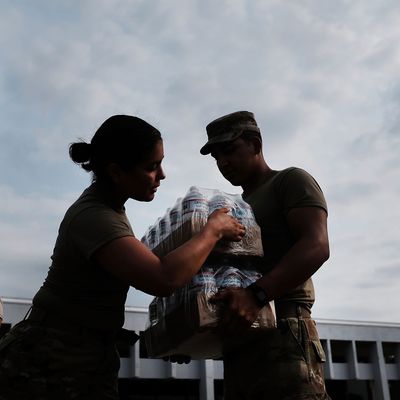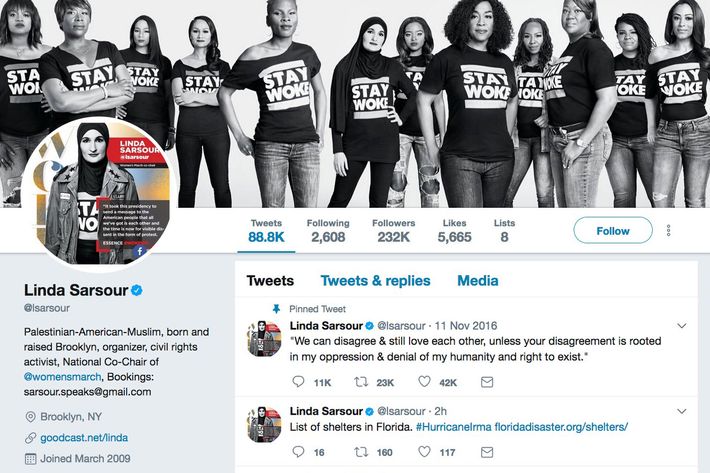
On first glance, the GOP’s hypocrisy on disaster aid looks about as subtle as the storms that produced it: After a hurricane devastated the (predominantly Democratic) Northeast in 2012, congressional Republicans voted against relief by a landslide margin; when a hurricane brought catastrophic flooding to the (predominantly Republican) states of Texas and Louisiana in 2017, those same GOP lawmakers proved nearly unanimous in their demands for federal aid.
It doesn’t take a degree in applied ethics to recognize the moral bankruptcy of this flip-flop. Heck, it doesn’t even take ethics, period, as Chris Christie has amply demonstrated. But beneath the GOP’s blatant hypocrisy on matters of hurricane relief, lies a less obvious, and more far-reaching moral myopia.
When congressional Republicans voted against aid for the victims of Superstorm Sandy, they didn’t actually argue that such help was unnecessary. Rather, they justified their opposition with reference to the (largely mythical) “pork” that had corrupted the aid package. Few House conservatives would argue that forcing people in landlocked communities to pay for hurricane relief in Galveston is socialism; or that we should trust the free market and faith-based groups to rebuild Houston; or that giving government handouts to people who chose to live in a flood-prone city undermines personal responsibility, and, thus, does them more harm than good.
But plenty would argue that forcing healthy people to subsidize the medical bills of the sick is slow-motion Stalinism; or that churches should be trusted with combating childhood poverty; or that giving food assistance and affordable housing to low-income families breeds a morally decadent culture of dependency.
What principle accounts for this discrepancy?
It can’t be that the government should only intervene to help blameless victims of forces beyond their control. A woman stricken with leukemia is no more responsible for her malady than homeowners in Dickinson, Texas, are for theirs — in fact, she is arguably less so (assuming she did not chose to live in an area with a well-known susceptibility to outbreaks of cancer). Similarly, a child born to impoverished parents can’t be blamed for her hunger any more than thousands of Harvey victims can be blamed for their sudden homelessness.
Conservatives could claim that, while the free market is incapable of providing disaster relief, it is more effective than the federal government at guaranteeing access to affordable health care. And that, while churches don’t have the resources to rebuild cities, they are better equipped than Uncle Sam to protect children from the scourge of poverty. But such arguments are belied by our nation’s history — along with that of every other liberal democracy on the planet.
It’s tempting, then, to conclude that the true principle dictating conservative attitudes about state intervention is simply: “Big government for me, but not for thee.” This view is especially compelling when one considers how many conservatives support subsidies for fossil-fuel companies or Big Ag. And yet, after congressional Republicans spent most of this year trying to make health care more expensive for their own elderly, rural voters, one can’t quite argue that they’re welfare chauvinists.
The most compelling explanation for why conservatives are comfortable with government intervening on behalf of disaster victims — but not on behalf of the poor, sick, or racially disadvantaged — may be this: In the first case, the victims’ suffering is the product of natural forces that conservatives feel no compulsion to downplay or defend; in the latter, their suffering is caused by racial and economic inequalities that can’t be remedied without the kind of downward redistribution that the modern GOP exists to oppose.
To stipulate that government can, and must, work to redress the harms wrought by economic inequality (including disparities in access to affordable health care) — or centuries of racial discrimination — is to indict the legitimacy of the market distribution of income and wealth. Conceding that government can, and must, redress the harms wrought by Tropical Storm Harvey requires no such indictment.
One piece of evidence for this hypothesis is how apoplectic conservatives get when progressives suggest that that last claim isn’t true.
Last week, the left-wing activist Linda Sarsour invited her Twitter followers to donate to the “#Harvey Hurricane Relief Fund.” That fund is administered by an organization that helped rebuild housing in disadvantaged neighborhoods after Hurricane Ike — and, also, registers low-income voters and encourages them to organize politically, to secure resources for their communities.
Many conservatives were scandalized by Sarsour’s “ghoulish” request.
The National Review accused Sarsour of trying to “make a quick buck” at “the expense of vulnerable Americans.” Several other conservative outlets echoed this line, even though Sarsour denies having any relationship with the organization she solicited donations for, and there is no evidence to suggest that she does.
One might criticize Sarsour for not mentioning the political nature of the organization in her tweet. But then, conservatives didn’t discover the Hurricane Harvey Community Relief Fund’s true nature through investigative reporting — they discovered it by clicking on Sarsour’s link: The activist linked to a donation page that detailed the organization’s mission, in boldface type. It is difficult to understand how this could be construed as an act of deception, especially when Sarsour’s Twitter account announces her own political leanings as loudly as it does.

But these mitigating factors were no match for conservatives’ visceral disgust at the Hurricane Harvey Community Relief Fund’s core premise: that aiding the the most vulnerable victims of a natural disaster and encouraging low-income people to organize, politically, have something to do with each other.
In The National Review, Alexandra DeSanctis quotes the HHCRF’s mission statement:
Together we will organize and advocate for our devastated communities, shining a spotlight on inequalities that emerge in the restoration of lives, livelihoods, and homes, amplifying the needs of hard-hit communities, and providing legal assistance for residents wrongfully denied government support.
She then writes:
This is pure political activism, not a charitable quest to assist hurricane victims as they rebuild their lives…not one cent of this money will be donated to people who have lost their cars, possessions, and even their entire homes. Instead it’ll be poured straight into the pockets of activists such as Sarsour as they continue their political posturing, dividing the country over race and “inequality” in the wake of Harvey’s devastation rather than focusing on the nonpartisan goal of helping Texans restore their community.
The first problem with this passage is that it appears to be factually incorrect. In an interview with Newsweek, one of the fund’s administrators, Ginny Goldman, claimed that its relief fund was being spent on “immediate needs,” including “groceries, cleaning supplies and rebuilding materials.”
The second, and more revealing problem with DeSanctis’s argument, is its insistence that organizing disadvantaged communities; securing legal aid for low-income people; and calling attention to any inequities that arise in the distribution of state and federal resources is irrelevant to helping “hurricane victims as they rebuild their lives.”
In fact, there is abundant evidence to the contrary. Effective political organization is rarely more critical to a community’s fate than in the aftermath of a natural disaster.
As Jonathan Katz wrote for the Washington Post last week:
The poor get smacked again when it’s time to rebuild. “They lack a lot of resources. Not just financial resources, but also information resources and social resources that help them access assistance,” [urban planning scholar Shannon] Van Zandt said…Disaster expert Kathleen Tierney wrote after 2005’s Hurricane Katrina that “some groups may be able to return to their pre-disaster status with relatively [little] difficulty, while others may never fully recover.” Following the 1994 Northridge earthquake in Southern California, many apartment complexes stayed vacant because owners decided not to repair the buildings, leaving impoverished renters on the street. A few years earlier, after the Loma Prieta earthquake that brought the 1989 World Series to a halt in San Francisco, victims who had been living in multifamily households missed out when FEMA made disaster assistance available mainly to higher-income homeowners.
Similar inequities plagued the initial response to Sandy, as the Post’s Janell Ross notes:
[T]hree New Jersey nonprofits discovered policies and practices that overstated the needs of homeowners and underestimated the number of renters who lost their housing and belongings in the storm, according to a complaint the nonprofits filed with the federal government. Aid plans did not ensure that the bulk of the aid money went to areas which suffered the most damage. Complete and accurate disaster aid information existed only in English. And because decades of federal, state and local housing policy had made white residents far more likely than others to own their homes, the entire plan was poised to do more to meet the needs of the state’s disproportionately white, middle-class and wealthy homeowners than others, according to that complaint.
Thanks to the “political activists” at the Fair Share Housing Center, New Jersey NAACP, and Latino Action Network, the Garden State and the federal government agreed to reform the Sandy aid program, thereby increasing the resources available to African-American and Latino renters.
In her piece, DeSanctis lambastes Sarsour for discouraging donations to the Red Cross. The conservative writer finds no fault with that organization, despite its well-documented history of misallocating relief funds (after Hurricane Isaac, the Red Cross reportedly “ordered dozens of trucks usually deployed to deliver aid to be driven around nearly empty instead, ‘just to be seen’”). But the idea that some portion of the donations that Sarsour solicited might be spent on political organizing is intolerable for DeSanctis — because relief efforts should be focused on nonpartisan goals, like rebuilding devastated communities; not partisan ones, like ensuring that poor and nonwhite people have a say in how their communities get rebuilt.
And anyone who asks conservatives to think hard about why, precisely, the former is partisan and the latter is not, is a “posturing” political activist who wants to divide our country.






























